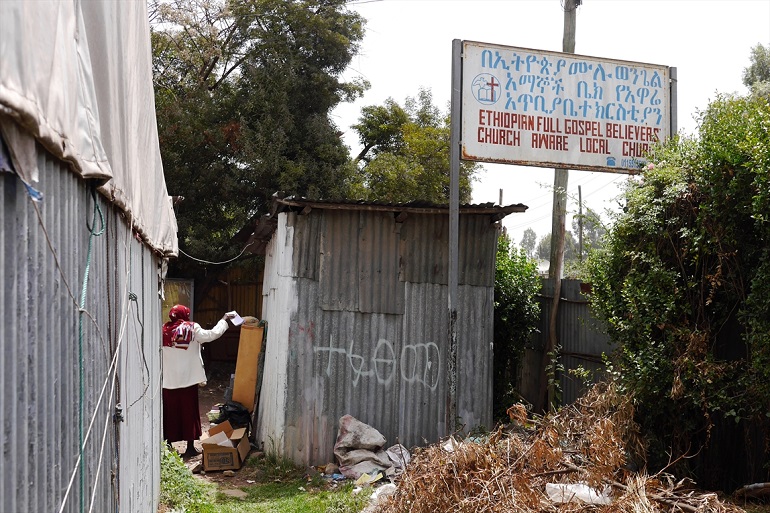
Rwanda has closed thousands churches in the country since February for alleged “noise pollution” and failing to comply with building regulations. Now Cameroon – another majority-Christian country – is considering following suit.
The call to shut down some of Cameroon’s Pentecostal churches follows reports of gross misconduct by a number of pastors.
Cameroon has previously enacted similar measures, such as in 2013 when it ordered the closure of dozens of “noisy” churches in an attempt to put an end to what it saw as anarchy among some Christian groups.
Those measures mainly targeted Pentecostal churches that weren’t officially recognised and were engaging in “unhealthy” and “indecent” practices, including “extortion of people in desperate situations”, the Minister of Communications, Issa Tchimora Bakary said at the time.
What’s happened in Rwanda?
Rwanda’s crackdown co-incides with a review of a law regulating the operations of faith-based organisations. Mosques have also been affected. About 100 have been closed, the leader of the country’s Muslim community, Mufti Sheikh Salim Hitimana, told AP. “We are now trying to fix what the government told us to do,” he said. According to the BBC, mosques in the capital Kigali have been banned from using loudspeakers during the call to prayer.
Under the proposed amendments that are currently being discussed in countrywide consultations, religious communities are expected to make sure their buildings meet standards in terms of infrastructure, safety and hygiene, such as at least two lavatories each for men and women. Requirements also include needing official permission to operate and the pastor receiving theological training.
Both churches and mosques need also to meet a minimum requirement in terms of land, and must come with enough parking spaces. The dimensions for this are set by the government and it also applies to buildings in the mountainous countryside, sources told World Watch Monitor.
To avoid noise pollution, the religious communities are no longer permitted to operate out of tents or in houses.
Pastors arrested
The BBC reported in February that some of the closed churches were allowed to reopen after they were approved by inspectors. But six pastors who protested against the closures were arrested for allegedly holding “illegal meetings with bad intentions”.
“They are suspected of forming illegal groups and conducting unlawful meetings with the intention of sabotaging or blocking an ongoing government exercise,” a police spokesperson said, according to Kenyan newspaper The East African. AP reported that others have since “refused to discuss the issue” with them.
Local sources told World Watch Monitor that “communication with Rwandans is complicated as email and phone conversations are being monitored. No-one has openly spoken out after the arrest of the six pastors”.
The six pastors arrested were: Bishop Innocent Rugagi of the Redeemed Gospel Church Rwanda; Apostle Charles Rwandamura of the United Christian Church; Fred Nyamurangwa of the Free Church Community Pentecost in Africa in Rwanda (Celpar); James Dura of the Healing and Deliverance Ministries Church; Emmanuel Shyaka Kalisa; and Rev. Emmanuel Ntambara.
Rights groups have long criticised the government for alleged clamping down on freedom of expression and restrictions on political space.
Others, however, have supported the closures, saying that the safety of people in churches came first and that it was necessary to have qualified leaders.
“Government efforts to have churches build better structures are welcome to all of us,” said Esron Maniragaba, president of the Evangelical Free Church of Rwanda and a leader with the Evangelical Alliance of Rwanda.
Churches mushrooming
Many of the closed churches are small Pentecostal congregations, a denomination that has grown rapidly in Rwanda and other parts of sub-Saharan Africa in recent years, with churches mushrooming. Some are small congregations who meet in makeshift structures, while other churches have thousands of people attending Sunday services.
Rwanda’s president, Paul Kagame, recently questioned why the capital, Kigali, would need to have 700 churches – it was in the capital and its surroundings where the first closures took place.
“Are these boreholes that give people water? I don’t think we have as many boreholes. Do we even have as many factories? This has been a mess!” he said.
But Phil Clark from SOAS, University of London, told the German newspaper Deutsche Welle: “Pentecostalism is growing exponentially there. The church closures are much more politically influenced than the government says. It signals to the churches that they are under observation, just like other social organisations in Rwanda. I take that as a clear warning.”